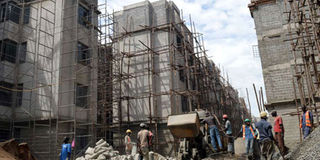All parties being ready is critical to providing affordable housing

Construction of civil servants' houses in Kisumu on November 23, 2016. President Uhuru Kenyatta announced a housing plan as part of his “Big Four” development agenda. PHOTO | RUSHDIE OUDIA | NATION MEDIA GROUP
What you need to know:
- According to the KNBS, 54,159 plans for residential houses with an estimated cost of Sh185.5 billion were approved for Nairobi.
- How quickly the plan can be realised depends on the readiness of the government and private developers.
The Jubilee government’s plan to provide a million affordable houses in the next five years is an ambitious undertaking that requires a high degree of readiness.
Ideally, since President Uhuru Kenyatta announced the housing plan two months ago as part of his “Big Four” development agenda, some 33,333 residential housing units should have been constructed and allocated to tenants and buyers.
At the rate of 200,000 houses a year, 16,667 houses should be completed monthly and 555 houses daily.
It takes several months to complete an average house.
So the expectation is that construction that began immediately after the announcement won’t produce new houses until later in the year — assuming that all the preliminaries, including architectural plans and approvals, are done before groundbreaking and building.
PLANNING
Delivering on the transformative plan would require massive mobilisation of resources to a scale that shadows the current spending on residential housing development.
The latest statistics from the Kenya National Bureau of Statistics (KNBS) show only 11,771 new residential houses were completed in 2016 with 8,623 (73 per cent) in Nairobi and a few others in other major towns.
The investment in the completed houses was Sh71.4 billion, out of which Sh66.3 billion, or 92.8 per cent, was in the capital.
Dwellings constructed in the rural areas aren’t captured in these figures.
A peculiar aspect of the housing equation is that there is a wide discrepancy between the number of housing plans approved and the units completed.
LAND
According to the KNBS, 54,159 plans for residential houses with an estimated cost of Sh185.5 billion were approved for Nairobi.
Completion as a ratio of approvals is just 16 per cent, which implies that there could be a fundamental problem holding back investors.
How quickly the plan can be realised depends on the readiness of the government and private developers.
Readiness is defined by a few critical factors, including the preparedness of the national and county governments to facilitate housing development, through public-private partnerships and private developers.
The authorities need to make available public land for housing and facilitate the process through enabling legislation and incentives.
Expediting issuance of titles, approvals for land sub-division and building plans are important steps in improving the confidence of investors interested in housing projects.
MORTGAGES
Finance is critical to affordable housing. Home buyers need affordable mortgages.
The financial constraints that have suppressed mortgages to below 25,000 should be resolved to expand access and banks to shift from short- to long-term financing.
Capital and labour present a critical challenge to the plan.
Cement, one of the critical inputs, is not sufficient to support large-scale construction.
Domestic output last year was 6.1 million tonnes, five per cent over the domestic consumption of 5.8 million tonnes, KNBS data shows.
ARTISANS
Either the domestic cement producers would have to rapidly expand their capacity to meet the demand or cement would have to be imported in massive quantities, risking the balance of payments.
While the plan is expected to contribute to the millions of jobs envisaged, the shortage of artisans needs to be tackled.
It would be an economic failure for Kenya to import artisans as millions of youth languish in desperation.
It happened during the building of the standard gauge railway, when skilled artisans such as plant operators were imported from China, the Philippines and elsewhere because such skills were reportedly not available locally.
The plan can be realised only if those entrusted with implementing the President’s vision are committed to ensuring its success.
Mr Warutere is a director of Mashariki Communications Ltd. [email protected].





